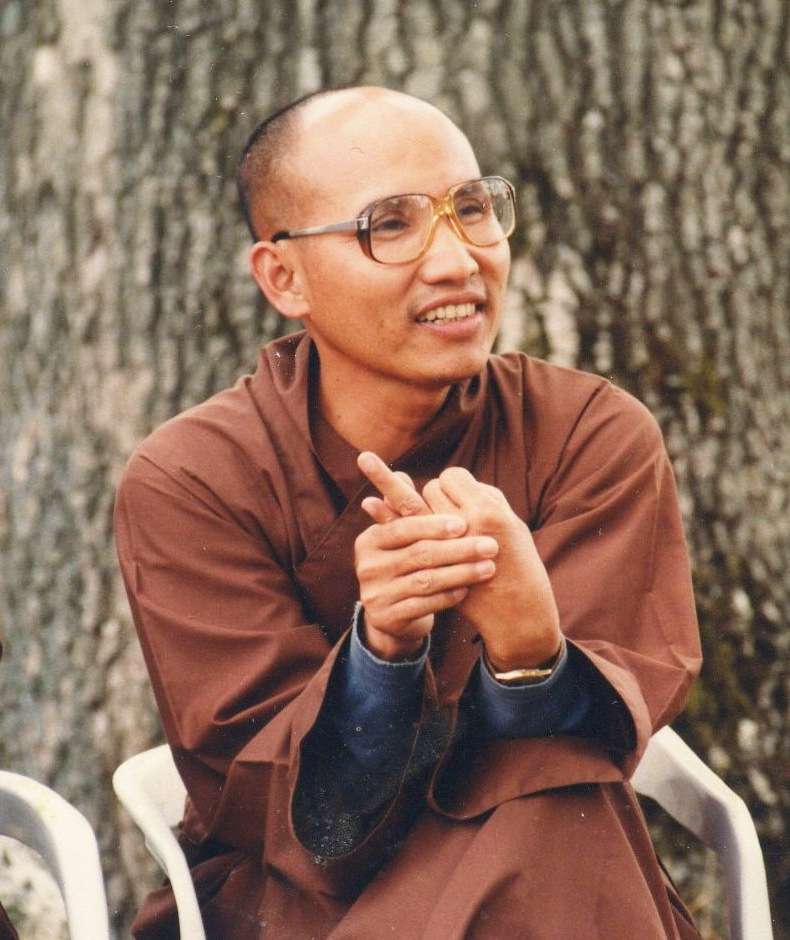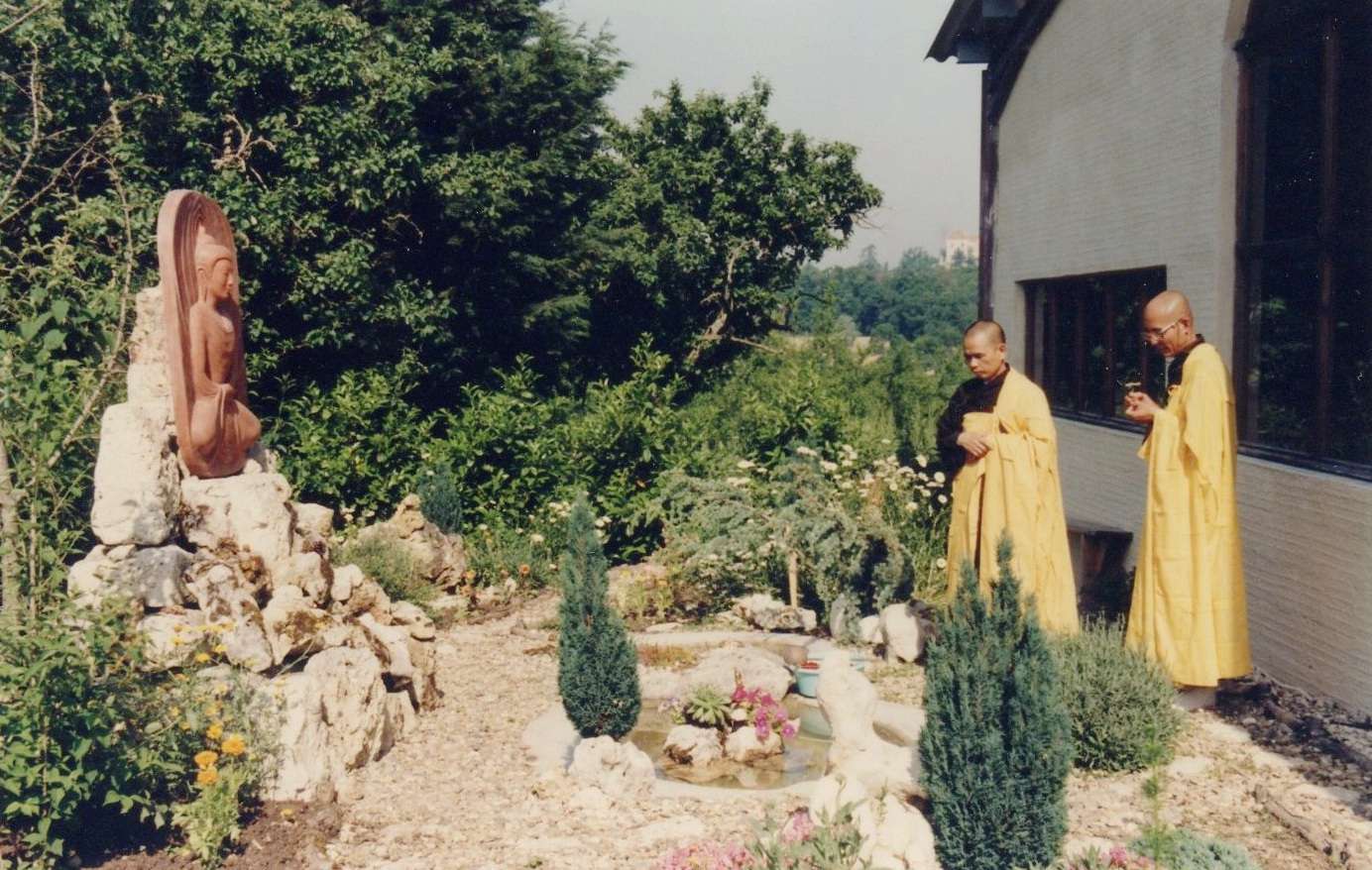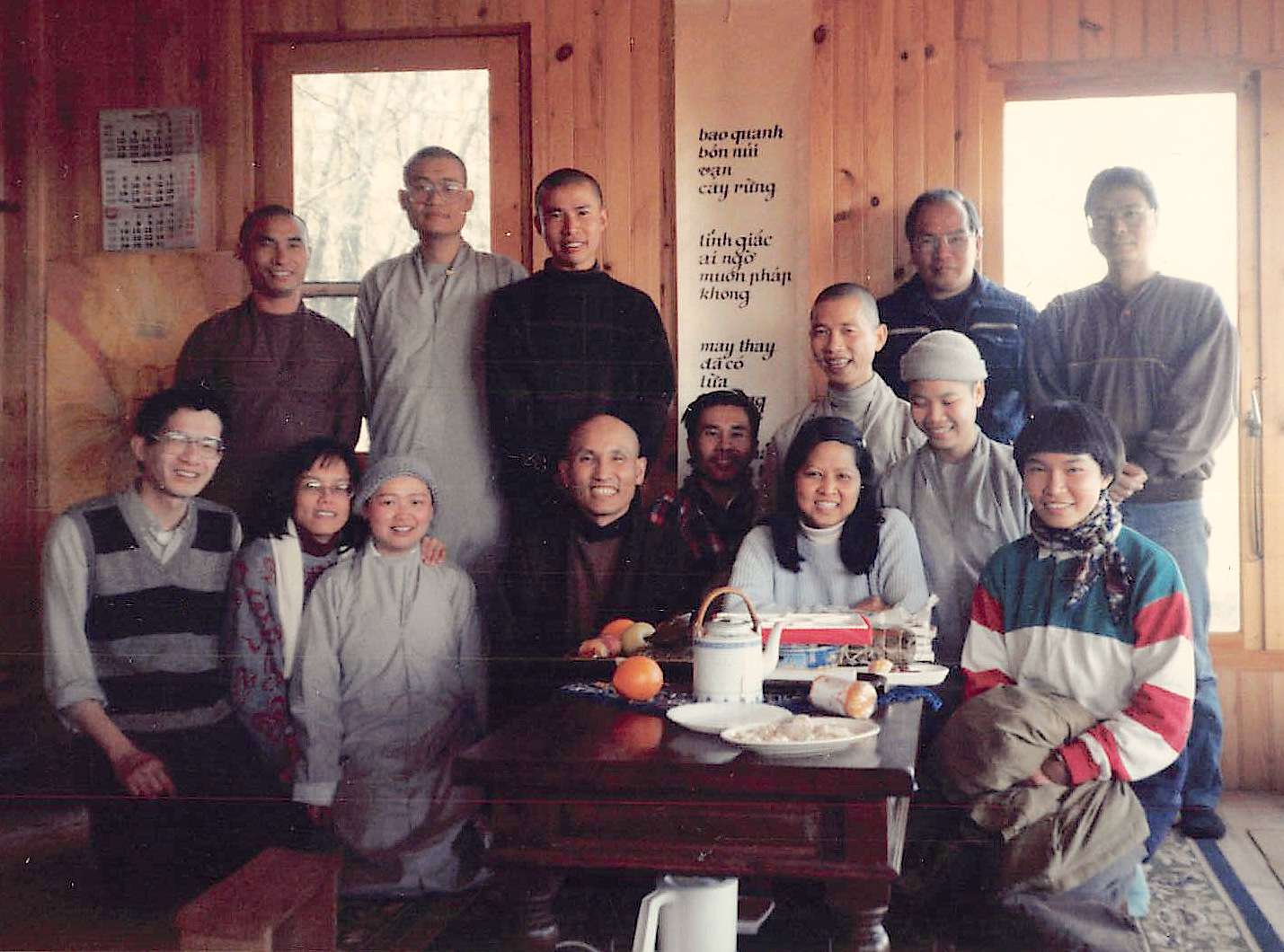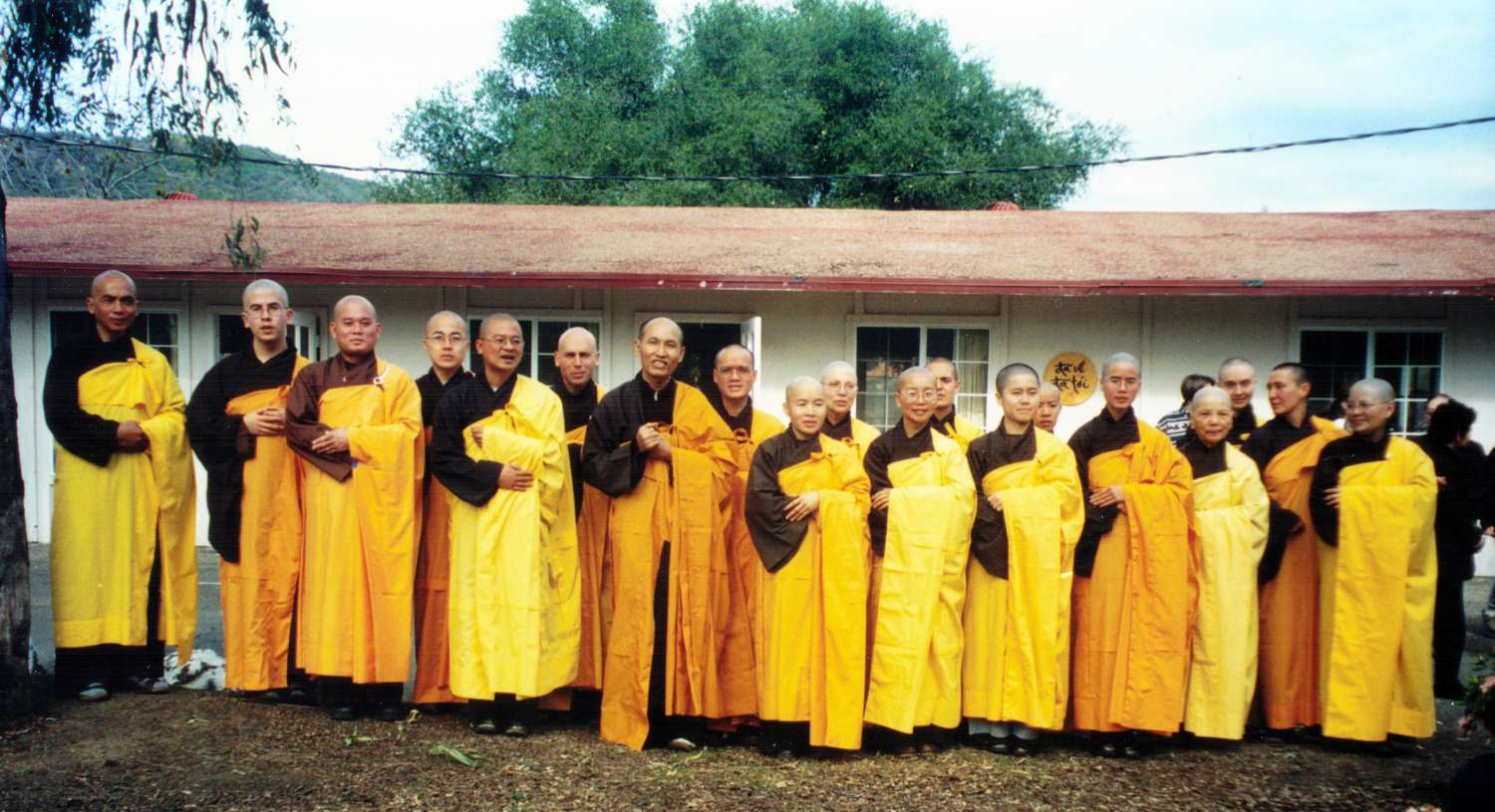
Brother Chân Pháp Niệm
Brother Giac Thanh
Br. Giac Thanh was one of the elder brothers of Plum Village. He lived in the Floating Cloud Hut on the hill looking towards the sunrise, right by Thay’s Sitting Still Hut in Upper Hamlet. That is why at times he was also called Brother Floating Cloud. In the early years when the Fleur du Cactus Meditation Centre in Paris, which later became La Maison de l’Inspir, was first established, every month Br. Giac Thanh would go there for a weekend to teach and guide the lay friends. Then he would return to the Dharma Cloud Temple to help the younger brothers progress in their practice. That is why some also called him Brother Fleur du Cactus.
Aside from the nicknames Brother Floating Cloud and Brother Fleur du Cactus, there was another name given to him by Thay – Tra Su (Tea Master). Perhaps this is the name that everyone liked and associated with Br. Giac Thanh’s Zen master style. He also really liked the name Floating Cloud. These two names captured his peace, freedom, and ease, and anyone who had a chance to approach him could enjoy these qualities because he always exuded a holy and pure energy. Friends from the West treasured him and loved being near him.
The seeker
When I arrived in Plum Village on the 12th June, 1994 to be an aspirant, Br. Giac Thanh was already there. He first came to Plum Village in 1991. I would like to recount a few anecdotes and special moments from my time attending and learning from my elder brother.
The story of how he came to Plum Village, according to what I have heard, is very interesting. Br. Giac Thanh was someone who always sought to learn, especially about meditation. While still in Vietnam, he had already learned meditation with Zen Master Thich Thanh Tu of Bamboo Forest Monastery (Tu Vien Truc Lam). At that time, his fellow students included Br. Thich Minh Nghia (now the Abbot of Toan Giac Monastery and also Giac Nguyen Ancestral Temple), Br. Thich Phuoc Tinh, who is now at Deer Park Monastery, and many others. Those who wish to know more about Br. Giac Thanh should come to the above-mentioned venerable monks, especially the Venerable Phuoc Tinh.

While searching for a teacher, as far as I know, Br. Giac Thanh was keen to learn, sincere, spacious, and someone who is not caught in the form. For certain work skills, or Zen rituals, perhaps he was not so proficient. He focused all his energy on the practice and preferred a quiet, contemplative life. He always had a burning desire to learn and to realize the essence of Zen. Br. Giac Thanh wandered everywhere wanting to learn, even after coming to the West. Whenever he heard of a well-known meditation master, whether lay or monastic, male or female, he would come to learn meditation with them.
He meditated diligently for long periods of time, reflecting in silence, hoping to realize the essence of Zen. Br. Giac Thanh often went into deep concentration and became completely unaware of his body. It is also perhaps because of this that whenever he sat in deep concentration, even while listening to Thay’s teaching, he often rolled his head back and forth without realizing it. Every time Thay saw this, Thay would call out: “Br. Giac Thanh, open your eyes! Don’t keep your eyes closed in concentration!” Hearing Thay, Br. Giac Thanh opened his eyes and his head stopped rolling.
The end of wandering and seeking
Br. Giac Thanh was searching for a teacher. One day while visiting family in Canada, he met Thay at a retreat in Maple Village, Montreal, Canada. Autumn in North America with its brilliant colours is always magnificent beyond words. One can only be silent and enjoy it, fully enjoy it. During one walking meditation, Thay and the sangha stopped, sat down on the grass to bathe in the fall colours, and drank tea. Br. Giac Thanh sat next to Thay. Amidst that wondrous reality Thay pointed at the radiant autumn forest and said, “Br. Giac Thanh, that which you have been searching for so long is right there! There it is! This is it!” Those instructive words were the last drop of water leading to an overflow, creating an opening, a loosening in Br. Giac Thanh’s mind, which reached a wonderful state of freedom. The happiness of that taste of freedom was immense. Perhaps only he could feel it clearly and no one else can possibly describe it. From then on, he truly stopped searching. He took refuge in Thay as his teacher until he passed away. Since that autumn, whenever the younger ones thought of Br. Giac Thanh, we couldn’t help but sing “One Maple Leaf Falls” as an offering to him. He really liked that song.
One maple leaf falls, my dear, do you hear it? One maple leaf falls, autumn returns with its beauty. A thousand leaves are falling, amber, crimson, gold. A thousand leaves are falling, soaring across the sky.
During the years of learning from him and drinking tea by his side, I heard from Br. Giac Thanh that before coming to Plum Village, he had a dream. In it, he was lying down and saw an old woman by the foot of his bed. She looked at him with very gentle, kind, and bright eyes, and said, “Come home my child.” Later when he met Thay, he saw that the old woman in the dream looked very much like Thay, and he was certain that she was no other than Thay. It is precisely due to these predestined conditions that Br. Giac Thanh always held Thay in his heart with much respect and love, in a quiet and infinitely lovely way.

The story of awakening while viewing the autumn splendor may remind us of the story of Zen Master Lingyun Zhiqin (Master "Sacred Cloud"). One morning he woke to blooming peach blossoms and suddenly became enlightened. Many doubts in his mind were dispelled and he touched the nature of life, of nonself. The master had spent thirty years to find the master swordsman, that is, finding one’s original face, one’s true nature. Peach blossoms bloom, the Zen master sees.
三十年來尋剑客
几回落叶又抽枝
自从一见桃花后
直至如今更不疑
For thirty years I’ve sought the swordsman.
Many times the leaves have fallen to sprout anew.
Following one glance at a peach blossom,
I no longer have any more doubts.Translated by Andy Ferguson, Zen’s Chinese Heritage: The Masters and Their Teachings (Boston: Wisdom Publications, 2000), pp. 183–184.
Thay offered a pair of parallel verses to Br. Giac Thanh when he passed away:
One maple leaf has fallen down, and yet you continue to climb the hill of the 21st century with us.
Thousands of daffodils are beginning to bloom and the earth continues to be with the sky, singing the song of no-birth and no-death.
Putting on the robe of freedom
There was quite a long period of time when Br. Giac Thanh went “sanghati free.” He came to precept recitations wearing just the long robe, or even just short robes covered with an Order of Interbeing jacket. The abbot at that time was extremely upset. Every time he saw Br. Giac Thanh, an elder brother, coming to the precepts recitation “sanghati free,” he showed his displeasure. Of course the unhappiness of the abbot, the second oldest brother in the sangha, was understandable. It was his responsibility to guide the sangha towards order, and not an unrestrained “free style.” Knowing this though, as much as the abbot was displeased and had already respectfully asked Br. Giac Thanh to wear his sanghati for the precepts recitation, to be an example for the younger ones, he remained “sanghati free.”
I was a young monk at the time. I barely understood what was happening and I certainly was not qualified to say anything. Thay must have heard the complaints and knew about it, but somehow acted as if nothing had happened. The other brothers also knew, but no one complained and no one followed suit. The fact was that Thay was Br. Giac Thanh’s’s teacher, and if Thay said nothing, how could we? Only Thay and Br. Giac Thanh understood each other at that level. Maybe that is why Thay said nothing. In the end, Br. Giac Thanh was still Br. Giac Thanh, “sanghati free.”
Spring in the West is incredibly beautiful. Come winter, the forest sheds all its leaves, leaving only bare branches and appearing as if dead. But after three months of sleep, the buds and shoots burst through rapidly and emerge as green leaves in just a short while. The forest was a tender green and full of life. There were times in spring when Br. Giac Thanh would sit on the deck of the Floating Cloud Hut and mutter, “My sanghati is the vast sky and earth, the green of nature; every day, I wear it at all times.”
Br. Giac Thanh had transcended false appearances into a signless reality that only he could deeply feel. Thay understood him. Though in form he did not wear the sanghati, in essence, in the heart of one who has reached the signless reality, he always wore the sanghati. He wore the robe of liberation that cannot be seen or known by others except for Thay. The stillness and freedom of zen masters are expressed in myriad ways. The special thing that everyone knows is–we cannot truly become a zen master by mere mimicry. If we try to mimic them, invariably we will be dealt a “Zen stick.”
Solid and free
Upper Hamlet in those early days when I first arrived was still very rustic. The material conditions and infrastructure were still quite poor. There were only about 15 monks at the time. We lived happily and contentedly together. On freezing winter days, the uninsulated bedrooms just had a small wood-fired stove (for heating) and a bed made of one sheet of plywood placed on four bricks. We lit the stove before going to bed, but by the middle of the night the wood had run out, the stove was cold, and huddled in our flimsy sleeping bags, we were also cold. Getting up in the morning was always a huge challenge. We had to be very heroic. If we wanted to get up, we had to do so right away! We danced around and moved our bodies for a while before bravely heading out to wash our face, brush our teeth, and then go for the morning practice session.
The old meditation hall was originally a cow shed. It did not have a fireplace and the walls were built of limestone. Even though it was icy cold, the brothers diligently continued the morning and evening meditations. Upper Hamlet had a small kitchen with an attic above it which was the monks’ dining room. The dining tables were arranged in a square so that while eating, the brothers could see each other and practise being present for each other.
One morning, after two sounds of the bell to end the silent meal, one younger brother (who was a very impatient person) stood up on the side opposite Br. Giac Thanh. Before anyone else could stand up, he shocked everyone by heavily insulting Br. Giac Thanh. As a younger brother, I couldn’t believe another young one could insult our eldest brother like that. For some reason he was so angry and was yelling, “Zen master? What kind of a zen master are you? You are shit, pee pee… !” When I looked over to Br. Giac Thanh I was even more surprised. He sat and ate calmly, peaceful, free, entirely unmoved by the insults. He looked at his younger brother with compassion and understanding. The other elder brothers intervened and dragged the young brother out of the dining room. I thought something big was going to happen.
But everything flowed smoothly as if nothing had happened. Perhaps Br. Giac Thanh did not allow the abbot to force the young one to apologize. Perhaps he left the matter for the other brothers to handle. Br. Giac Thanh was by nature tolerant, spacious, and always wished for things to be simpler. A few days later, the young monk went by his own will to Br. Giac Thanh’s hut, and put on his sanghati to touch the earth in repentance for his ignorance. Br. Giac Thanh did not allow him to prostrate. Instead, he asked him to take off his sanghati and sit down to drink tea with him. Br. Giac Thanh shared, listened, and guided the young monk in a gentle way. Right after that, it was as if nothing had ever happened. That incident gave me firmer trust that liberation and awakening are real; it is something we can witness with our own eyes and not just something to be read about in books. I am happy to have had a chance to be near such an elder brother.
Nothing is born, nothing dies
Once while being Br. Giac Thanh’s attendant, I accidentally broke one of his tea cups which belonged to an antique set that he really treasured. Br. Giac Thanh was a tea master. Tea masters always had good tea and precious tea pots. But he only had that one set. One day, Br. Giac Thanh was washing his tea set on the deck of his hut and asked me to find a dishwashing sponge. When I brought it to him my toe accidentally touched one of the four cups, it rolled away, then suddenly broke into two. I was so scared! My face went ashen and my body shook uncontrollably.
Seeing this, Br. Giac Thanh quickly picked up the two broken pieces and hid them behind his back. “Huh! Nothing is broken. Isn’t that right my child? This cup has never been broken. It pretends to be broken. But how can it be? Everything comes together due to conditions and then hides due to conditions. Its nature is non-broken.” I was scared and felt so sorry because I knew he really loved those cups. But after hearing his words my heart was lightened. He compassionately took away my fear and even taught me the no-birth, no-death nature of the tea cup. That was a lesson I would never forget. Br. Giac Thanh really treasured the tea set, but he was also ready at any moment to let it go.
The sweet inner child
For a long time Br. Giac Thanh did not go for walking meditation with the sangha. Severe diabetes had hit him. Apart from being Thay’s attendant, I also took care of Br. Giac Thanh’s food and laundry for two years. An ordinary person could not possibly eat his food because it did not have any seasoning, not even salt. I had to be very creative to make inspiring dishes. Br. Giac Thanh ate very well, but no matter how well one eats or how hard one tries, one still gets bored. One time he was incredibly bored by the food and somehow, found a packet of instant noodles and secretly made it. I caught him and tried to stop him from eating it. Br. Giac Thanh said, “Phap Niem, let your elder brother eat just one packet to ease the boredom.” I could not stop him. Actually I was only pretending to stop him because I knew he had been so very bored of his food.

Once Br. Giac Thanh had swollen ankles and could not walk easily unless he really tried. Because he did not go for walking meditation for many months, Thay personally visited him and asked him to come walk with the sangha. Br. Giac Thanh said his legs hurt and he could not walk. He thought this way, Thay would leave him alone. But who would have expected Thay to pressure him to go for walking meditation? Thay scolded him lightly and told him he had to walk outdoors for his legs to heal. Not daring to disobey Thay, Br. Giac Thanh managed to follow Thay’s instructions. But he harboured the thought: Yes, ok, let’s go. I will walk and let my legs swell up, then you will see. Already there is no pity, now even forcing me to go to walking meditation! But after walking with the sangha for about one week a miracle occurred–his swelling went down, his legs healed and he could walk easily again. Br. Giac Thanh was very surprised and he exclaimed, “Huh! The old man is scary!” We all have a little child in us no matter how old we are, and that inner child is innocent and uniquely beautiful.
The song of immortality
In 2001 during Thay’s teaching tour in China, we received the news that Br. Giac Thanh had passed away. Thay and the brothers and sisters held a memorial service on the bus because the tour schedule was so busy. In his last years, Br. Giac Thanh was appointed by Thay to be the abbot of Deer Park Monastery. He was a superb abbot, working during the day and lying down to rest in the evening. He wore a dialysis bag for twelve hours. Everyone loved him so much.
Deer Park Monastery is in Southern California. For some unknown reason, when Br. Giac Thanh went there to be the abbot, he started to wear his sanghati again. “At every point, be sovereign of yourself. Wherever you stand, be your true person.” (Master Linji–随处作主,立处皆真). Depending on the place, the situation, and the people, Br. Giac Thanh knew how to respond appropriately. Everything is manifestation. For him, holding on or letting go, he was free. A free person is not caught in any form or sign, not even in “signlessness.” In the Diamond Sutra it says–Subhuti, if you think that the Tathagata realizes the highest, most fulfilled, awakened mind and does not need to use all the signs, you are wrong. Subhuti, do not think in that way.
At Deer Park Monastery on the side of the mountain, a memorial stupa was erected for Br. Giac Thanh and in the heart of it is engraved a posthumous poem written for him by Thay.
That you are a virtuous one is already heard by everyone,
the work of a true practitioner has been accomplished.
When your stupa has just been raised on the hillside,
the sound of children’s laughter will already be heard.

Br. Giac Thanh was truly a hero, a great man. He had accomplished the most worthy deed of a practitioner–the career of awakening. He built his stupa not with stones but with liberation, awakening, solidity, and freedom, and we continue to benefit from them. That stupa is also his sangha. In the years since Br. Giac Thanh passed away, many young people, both Vietnamese and American, have come to practise and ordain at Deer Park Monastery. They are all his continuation. The laughter of innocence, joy, and freedom still echoes in those endless skies.
There are many who can recount more wonderful moments with Br. Giac Thanh, more so than I. Whenever I sit down to make a pot of tea, I remember him through the vivid Dharma sounds that resonate in my mind and the warm cups of tea he taught me to drink with awareness. “Ha! See?” Br. Giac Thanh is still there in each of us, teasing us and drinking tea with us. “Ha! Ha! Ha!”
With my deepest respect
to my beloved elder Brother Giac Thanh,
Chan Phap Niem